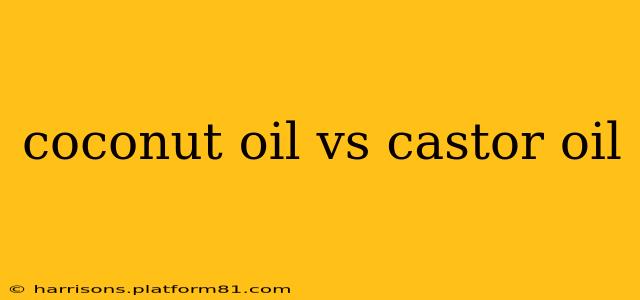Choosing between coconut oil and castor oil can feel overwhelming, given their widespread popularity and purported benefits. Both are natural oils with unique properties, making them versatile additions to your beauty and health routines. This comprehensive guide delves into the differences between coconut oil and castor oil, helping you determine which oil best suits your needs.
What is Coconut Oil?
Coconut oil, extracted from the kernels of mature coconuts, is rich in saturated fatty acids, primarily lauric acid. This composition gives it a high melting point, meaning it solidifies at room temperature. It's known for its moisturizing and antimicrobial properties.
What is Castor Oil?
Castor oil, pressed from the seeds of the Ricinus communis plant, is primarily composed of ricinoleic acid, a unique fatty acid with potent anti-inflammatory and moisturizing effects. Unlike coconut oil, it remains liquid at room temperature.
Coconut Oil vs. Castor Oil: Key Differences
| Feature | Coconut Oil | Castor Oil |
|---|---|---|
| Composition | High in saturated fatty acids (lauric acid) | High in ricinoleic acid |
| Texture | Solid at room temperature, melts easily | Liquid at room temperature |
| Smell | Mild coconut scent | Distinct, sometimes strong, slightly unpleasant scent |
| Absorption | Absorbs relatively quickly | Absorbs more slowly, can feel heavy/sticky |
Coconut Oil for Hair
Coconut oil's popularity in hair care stems from its ability to moisturize and condition. It can help reduce protein loss, improve hair elasticity, and protect against damage from heat styling. However, it may not be suitable for individuals with fine hair, as it can weigh it down.
Does coconut oil promote hair growth?
While coconut oil can improve hair health and reduce breakage, leading to longer hair, there's limited scientific evidence to definitively support its ability to directly promote hair growth in the same way as minoxidil. It primarily works by protecting and conditioning existing hair.
Castor Oil for Hair
Castor oil is highly lauded for its potential to stimulate hair growth. Its ricinoleic acid content may enhance blood circulation in the scalp, potentially nourishing hair follicles and promoting growth. It's often used to thicken hair and improve its overall appearance. However, its thick consistency can make it challenging to rinse out completely.
Does castor oil thicken hair?
Castor oil's ability to thicken hair is anecdotal, but many users report improvements in hair volume and thickness after consistent use. The increased scalp circulation it may stimulate could contribute to healthier, fuller-looking hair.
Coconut Oil for Skin
Coconut oil is a popular moisturizer for all skin types, providing a protective barrier and locking in hydration. Its antimicrobial properties can also help combat mild skin infections.
Is coconut oil good for acne-prone skin?
The effect of coconut oil on acne-prone skin is debated. While its antimicrobial properties might seem beneficial, its comedogenic nature (potential to clog pores) means it may exacerbate acne in some individuals. Those with acne-prone skin should use it cautiously and in moderation.
Castor Oil for Skin
Castor oil is frequently used to treat various skin conditions. Its anti-inflammatory properties may soothe irritated skin, while its moisturizing qualities alleviate dryness. It's also sometimes used as a carrier oil for other essential oils in skincare treatments.
Is castor oil good for dry skin?
Castor oil's moisturizing properties make it an effective treatment for dry skin. However, its thick consistency might feel heavy for some.
Coconut Oil vs. Castor Oil for other uses
Both oils have various other uses, including cooking (coconut oil primarily) and as a natural lubricant. However, their distinct properties dictate their suitability for specific applications.
Choosing the Right Oil: Coconut Oil or Castor Oil?
The best choice depends entirely on your individual needs and preferences. Consider your hair type, skin condition, and desired outcome when making your decision. Many find it beneficial to incorporate both oils into their routine, using coconut oil for general moisturizing and castor oil for targeted hair growth stimulation or skin condition treatment. Remember to conduct a patch test before applying either oil liberally to avoid allergic reactions.
